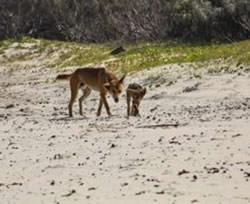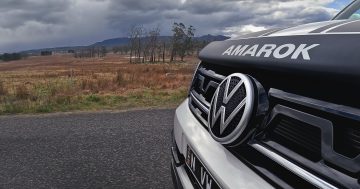 Visitors to World Heritage-listed island K’gari (Fraser Island) have been reminded by Queensland Parks and Wildlife Service (QPWS) to be Dingo-safe! and keep a look out for wongari pups during winter.
Visitors to World Heritage-listed island K’gari (Fraser Island) have been reminded by Queensland Parks and Wildlife Service (QPWS) to be Dingo-safe! and keep a look out for wongari pups during winter.
According to QPWS, following the annual wongari (dingo) breeding season in March and April, female wongari are now giving birth to, and caring for, their litters.
Fraser Coast Ranger in Charge, Linda Behrendorff said it was important for wongari and their pups to be left alone, both for visitor safety and the wellbeing of the animal.
“Although wongari, and especially their pups, may look like cute domestic dogs, they are wild animals and should be treated as such,” Ranger Behrendorff said.
“Like many mammals, wongari are protective of their young and may become defensive if they feel there is a threat to them.
“It’s important to never feed dingoes or leave food where it can be accessed by animals.”
Ranger Behrendorff said cameras had been trialled on collars and QPWS had been able to watch the wongari clean and feed and noted they usually gave birth to between four and six pups at a time and care for them for about two months before they become independent.
“If you see wongari and their pups on K’gari, remember to give them space,” she said, “as K’gari is their place and it’s important that they can remain wild animals.”
She said that in order to keep wongari wild and to stay safe while on K’gari, visitors, tour operators and residents are advised to be dingo-safe by following a few rules:
NEVER feed dingoes.
Always stay within arm’s reach of children, even small teenagers.
Walk in groups and carry a stick.
Do not run. Running or jogging can trigger a negative dingo interaction.
Camp in fenced areas when possible.
Lock up food stores and iceboxes (even on a boat).
Never store food or food containers in tents.
Secure all rubbish, fish and bait.
Ranger Behrendorff urged families with young children to camp in fenced QPWS camping areas at Lake Boomanjin, Central Station, Dundubara, Waddy Point, Wathumba and eastern beach fenced areas (Wongai, One Tree Rocks, Cornwells, Eli), or at fenced private camping areas at Dilli Village or Cathedral Beach.
She said all wongari encounters should be reported to the Department of Environment and Science (DES) immediately, which can be done by alerting the nearest QPWS ranger, emailing [email protected], or phoning (07) 4127 9150.
She advised to take note of location, vehicle registration (if relevant), wongari ear tag colour, number and which ear.
A full list of Park Alerts can be accessed at this PS News link.



